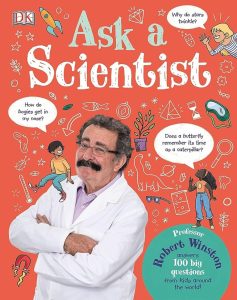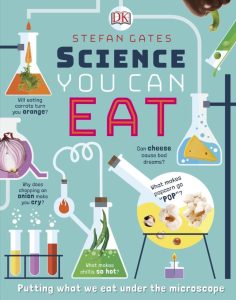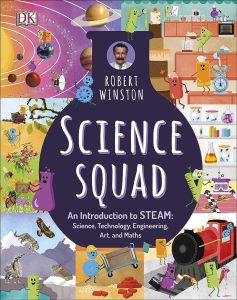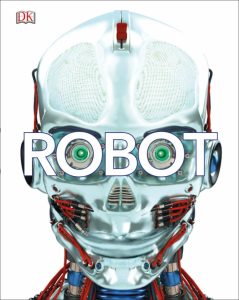To celebrate National Science Week, 12 August – 20 August, EducationDaily is publishing a series of STEM-focused articles featuring inspiring Australians and innovative ideas.
Foster a passion for science in your classroom with these science books for primary school children. Including subjects like chemistry, physics, biology, astronomy, and technology, these books are the perfect curriculum companion for nurturing the curiosity of young aspiring scientists.
Ask a Scientist
Recommended: 7-9 years

“Why do freckles come in dots on your face?” “Could you jump off the world?” “Why is the sky blue?” Featuring 100 questions from real kids around the world – and expert answers from Professor Robert Winston – this weird and wonderful Q&A book is an eye-opening adventure that introduces students to the world of science.
Why Does the Earth Need the Moon?
Recommended: 7-9 years

Featuring sinkholes and stalactites, mammoths and meteors, this globe-trotting question book will keep young readers in awe for hours at a time. Important issues like global warming and ocean pollution are introduced, teaching children how nature works and what the can do to keep our planet healthy.
Science You Can Eat
Recommended: 7-9 years

Join Stefan Gates on a fun and flavourful adventure through the science of food. This book will cook up some great classroom lessons and conversations, including the world’s smelliest fruit, the sticky science of gum, glowing drinks and colour-changing cabbage. Find the answers to all your favourite food questions, like why popcorn goes “pop”.
Science is Magic
Recommended: 5-7 years

Science experiments meet magic tricks in this infectiously fun book of simple projects by Steve Mould. Young magicians will love wowing their friends as they make tinsel levitate, and glass beakers disappear – all with the power of science.
Each magic trick is explained step-by-step using photography explaining the science principals. Plus, kids can see for themselves how legendary magicians like Harry Houdini used science to perform some of their most famous tricks.
Outdoor Maker Lab
Recommended: 9-11 years

Learning doesn’t need to happen under a roof – take exciting science into the great outdoors with this extraordinary book of projects. Learn about everything under the sun with interactive experiments, including a water rocket, a latitude locator and giant bubbles.
Crafty Science
Recommended: 5-7 years

Award-winning author Jane Bull combines DIY arts, crafts, and cooking activities with simple scientific principles, showing students that science, technology, engineering, art, and maths are all around us. Discover the science of buoyancy by building a plastic bottle boat, and creating a swirling snowstorm in a jar to understand gravity.
Science Lab
Recommended: 9-11 years

An action-packed and accessible introduction to STEM (science, technology, engineering, mathematics), this brilliant book includes step-by-step projects for young scientists. Kids can learn how to build a wind-up car, a wind turbine, a suspension bridge, a geodesic dome and more.
Simple, easy-to-follow, photographic steps guide young readers through every experiment, along with handy tips and the occasional STEM fact. “Test and tweak” boxes encourage readers to take their projects to the next level, while real-world stories demonstrate how STEM ideas make up our everyday world.
Science Squad
Recommended: 5-7 years

This is the perfect introduction to STEM learning, packed with zany characters and cheerful text. Breaking complex concepts into understandable chunks answers questions like how robots work. What is a food chain? And where does lightning come from?
Women in Science
Recommended: 5 to 7 years

This inspiring book highlights extraordinary women whose scientific discoveries transformed the world. From Hypatia to Marie Curie, it’s full of fascinating facts and is the perfect companion to a STEM curriculum.
Complete with striking artwork, this collection also contains infographics covering lab equipment, rates of women currently working in STEM fields, and an illustrated scientific glossary.
Knowledge Encyclopedia Science
Recommended: 9-11 years

Explore the wonders of the natural world in this spectacular science compendium. Extraordinary images will enthral young readers as they learn about storm clouds, tectonic plates, molecules, magnetism and more.
Amaze the classroom with 3D computer-generated images bursting from the page, detailing the tiny atoms that make up our universe and the unseen forces that keep it all together.
How to Be an Engineer
Recommended: 7-9 years

Curious kids will adore this powerful project book by Carol Vorderman, which encourages young engineers to discover extraordinary science in the everyday. Discover jet propulsion using balloons and build a robot arm from rulers, all while learning how to think like an engineer.
The Bacteria Book
Recommended: 7-9 years

A surefire winner with even reluctant readers, this fun and silly guide by Steve Mould is full of delightfully disgusting knowledge that will make kids will love.
Featuring quirky character illustrations, and a lot of fun facts, this book uses real-world examples of microbiology to teach kids how microbes keep our bodies running.
All About Virtual Reality

Recommended: 7-9 years
How does VR work? This exceptional book allows children to understand virtual reality technology and to hop aboard the International Space Station without leaving their seats. Including a VR viewer to make at home, plus an accompanying app and stickers, this book is the perfect introduction to the science of virtual reality.
Robot
Recommended: 9-11 years

Dive into today’s cutting-edge robotics technology with this truly eye-opening book on the machines of the future. Including bionic ants, surgeon robots, and the most advanced artificial intelligence (AI), kids and adults alike will be wowed without end.








